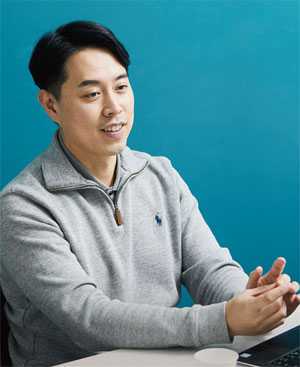Korean Cosmetics Owe Much to Leading Distributor
17 December, 2019

Korean cosmetics still play a considerable part in the Chinese market, not least thanks to cross-border traders like AIONCO.
By taking orders through their global beauty distribution platform AFS MALL, they provide customized logistics services through AFS WORKS, so buyers from all over the world can order products from a variety of Korean cosmetics. Without such distributors, buyers would have to contact each cosmetics company separately to place orders, pay the transport costs and handle customs clearance themselves.
Justin Jun is the CEO of Korean operations of AIONCO, whose head office is in Sinsa-dong, Gangnam, Seoul. How did this year's Gwanggun Festival, China's version of Black Friday, go?
"It was our fourth year at the festival since we founded the company in 2015 and my first time working with Alibaba as a partner. Alibaba's retail team now buys directly, meaning they can organize their own sales items and expose them to shopping malls."
"Alibaba is very careful when choosing their direct purchase partners. It seems to have acknowledged our history of delivering to many e-commerce buyers in China. There are about 30 buyers. In preparation for the festival, Alibaba also suggested several more Korean brands to contact."
"We have been preparing for the festival since August. The logistics warehouse has doubled its size to have everything ready and W5 billion won worth of supplies sold out in less than an hour (US$1=W1,174). Working with Alibaba has been a great experience. The result was successful. The miscalculation rate of delivery was less than 0.3 percent and the damage rate less than 0.1 percent."
AIONCO mainly focused on providing services to China until last year but has now expanded sales through AFS MALL. This year, cosmetics were sent to over 600 buyers from over 50 countries including Bangladesh, Malaysia, Singapore, the U.S. and Vietnam.
◆ Why do they use an intermediary trading company like AIONCO?
"Because of diversity and price competitiveness. E-commerce companies value product diversity. Since trends change quickly, they want to control multiple items at once. There are 20,000 cosmetics brands just registered in Korea, and if each brand produces 100 kinds of cosmetics, there would be more than 2 million different products. Our role is to quickly obtain the products each buyer wants. It is a kind of direct market, leading it to become price competitive."
◆ What distinguishes Korean cosmetics?
"Many countries have a good image of Korean women through K-pop or Korean drama. Recently I went to India and saw that Korean dramas are also popular there. They were highly interested in Korean makeup and fashion. Korean cosmetics have become their own category."
"In a short period, the market has become one of Asia's powerhouses. It is questionable whether there was a marketing strategy tailored to it. Some companies have grown their appearance without solid brand management, that is, production is done in large quantities first, and then pushed to the market."
"This method worked until 2018, but it doesn't any more. As the product lines increased massively, there are too many choices for overseas buyers. There has to be a clear differentiation from other products in order to survive in the market."
◆ Could strained diplomatic relations, as with China, have an impact?
"In terms of numbers, the impact on Korean cosmetics was not big. Instead sales were becoming more distributed as brands grew in numbers. The total volume of traffic from Korea to China is skyrocketing, but brands don't realize it. In fact, they might even feel that it has shrunk."
"One problem is that flagship stores go up only in Korea but marketing is concentrated in China. There are companies that are not well-known here but sell W10 billion a year in China. In some cases, the Chinese found a company in Korea. Even if the company has more Chinese staff, they can say that their products are made in Korea so that they can sell more."
◆ AIONCO also acts as a marketing agent for China.
"We become a marketing agency of China for products that are popular in Korea but not recognized overseas or that are brand new. We have team members in Beijing, Hong Kong and the U.S. who deal with influencers. China, has The RED instead of Instagram, which integrates commerce functions with the photo sharing app."
"Many of the over 300 million users are white-collar women in their 20s and 30s. Last year, the company received investment of W3 trillion from Alibaba. We use The RED to select influencers for our most efficient and effective marketing."
◆ What products or brands do different countries prefer?
"Chinese prefer premium brands like Amore Pacific's Sulwhasoo or Whoo from LG Household and Health Care. Different countries have different product needs. In India, buyers often look for depilation cream. Overall, demands for hair and body products such as shampoo and conditioner and tooth whitening products are increasing."
"Now we are going beyond taking orders to predicting orders. For example, we analyze what to prepare, assuming we want to source Korean products in India."
◆ What are your future plans?
"We are investing a lot in IT. This year, we acquired U.S. company Three On and are trying to figure out how to make logistics more efficient. Warehouse management software is being developed that would enable us to manage real-time inventory of warehouses in each country, reflecting voices from the field so that both the warehouse manager and the vendors who supply the goods can use it."
"Another is collecting and analyzing big data of cosmetics. This is because there is currently no data on how many cosmetics are being sold in each country. So far, I've actually done a lot of business by making rough estimates, like simply assuming which products would be popular in which countries. Now, I want to be able to make decisions based on hard data."
Source:
TAG(s):
